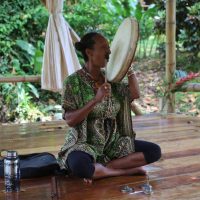Speeding to get to teach a yoga class while bobbing and weaving in and out of traffic in the small town of Domodossola, Italy…
The self-talk is always the same. “Why didn’t you leave earlier? You could have…what you were doing could have been left for another time. Why do you need this stress, this battle with unworthiness, disappointment, and shame just to get to an appointment?”
I cussed people out as I speeded and stressed about being late with the possibility of being stopped and given a ticket by the Italian police. It did happen once. I always end up being more late, more broke, and more stressed out.
I say that was roughly 25 to 50 percent of my trips to teach a yoga class.
My teenage son, Joshua, and I went out for dinner with our friend, Nando. Joshua says something. He confronts me about some behavior I’ve done or words I’ve said. I am triggered and respond defensively. I file it away until our drive back home and start a rampage of anger while defending and justifying my anger. I usually follow this with the silent treatment for hours or days after the emotional blackmail punishment. My silence says, “These are the consequences of triggering me.”
When we are triggered, we are conditioned to make the person or situation in front of us at fault for our triggers and the reason we are upset, not recognizing that, in fact, our past is calling our attention.
Can you relate? Perhaps not you, but maybe someone you know?
Resmaa Menakem says that this is when we are blowing our trauma into another body. In his book, My Grandmother’s Hands, he calls it “dirty pain.” He says that clean pain is when we choose to be in our bodily sensation, feeling the physical reactivity, settling our nervous system, and, I would also suggest, keeping our mouth closed until we are settled. Once our nervous system is settled, we are able to connect to our original wound, not dissociating, denying, defending, or annihilating the person or situation that triggered us. We can also clean up any mess we’ve made.
These are the patterns we are living in our private spaces. They remain there because of the shame that works great for what Eckhart Tolle brought to our awareness as the pain body. From what I have come to see, the emotions that got stuck in our system also get trapped in our pain body, like a spider web or a network. The more you try to remove the offending emotion, the more the act of pulling away activates and vibrates the pain body. It has to undergo a process of alchemy with love.
You have to love that emotion—that person who you were or still are, trapped in a pattern without knowing how to stop.
I didn’t want to be that person. I couldn’t f*cking stand that b*tch who continuously reminded me of how much of a perpetrator I actually was, versus being the victim or heroine of my inner stories. If it weren’t for her, I wouldn’t have to apologize and make amends so much because she couldn’t keep her sh*t together.
That was my nervous system then.
The biggest change to that and in the shortest amount of time was starting a network care session when we moved back to the United States. This was the next step in my spiritual journey—in my human evolution. It was the long-term solution for my back problems.
The other significant thing that came to my path, following two years of network care of initiated kundalini activation, was being guided by one of my best friends to a trauma resiliency course for people of color held in Asheville, North Carolina. She saw the difficulties I was experiencing as more than a kundalini awakening. In the book When Spirit Leaps by Bonnie L. Greenwell, she writes that experiencing a history of trauma causes a more intense awakening experience.
At the first meeting of the six-week course, my eyes were opened to the “why.” Why I had been so verbally reactive and defensive and, at times, physically violent. It explained why was I depressed, overwhelmed, and needed to rely on alcohol, drugs, and sex while attracting suffering.
I recognized that my personal trauma had become what I thought was my personality, but I also started to see how racial battle fatigue was affecting me. How my nervous system was programmed to comfort white people. It wasn’t just something I learned in this life but it was actually in my genes from my ancestors. It was a strategy to survive white people being triggered and destroying African bodies, according to what Resmaa explained.
What I see now is when the energetic floodgates opened, it gave me two years to learn how to process the personal trauma stuck in my body. The trauma that talk therapy had only managed to move around but never actually released from the system. After two years of working on my personal and ancestral trauma, I had the capacity to begin to acknowledge the racial trauma.
Now for some bad news. In order to process some or much of my trauma, I had to be triggered by someone or an event. It’s the only way I could recognize what I had to work on—what I had to process out of my body. Relationships and intersecting with other humans help us literally disarm ourselves. Processing takes the pin out. Clean pain takes the pin out.
Resmaa also explains that trauma is in the body. Your body holds what you are not consciously aware of. When you are triggered, the emotional charge matches what is held in the body already. Many of us are habituated with focusing on what just happened as the cause of our discomfort, our pain rather than tracing the origins. There is always an origin point. It didn’t just hurt you at that moment; it hurts in that moment because it was hurting already.
I hadn’t ever called it trauma. I didn’t even know that’s what it was. I thought I was processing my childhood, recapitulating the memories that had a charge, which I felt uncomfortable remembering. I felt an urge to reject the memory. It was the trauma resiliency course that gave me a name and a “why.” I learned what and how triggers feel because my pattern was to numb and dissociate from the trigger, which is a form of pretending it didn’t exist. It was my way of coping during abuse in childhood. Yet, all this disconnection grew into a silent time bomb.
Emptying my container gave me the emotional and spiritual energy to release and feel the racialized, ancestral, and personal trauma in my system, frozen in stasis. The work will continue for the rest of my life, albeit slower and with less intense triggering as I continue to do the work. Now, I can witness and feel it at the same time sometimes. However, progress, patience, and kindness are all needed when working with trauma.
Up to my early 20s, I thought that most people’s families and childhood were like The Partridge Family on TV. I thought my life experience was an unfortunate outlier.
Now I realize that my life experience is in my choice not to give up and allow my past to win. That has led me to my work in the world. Life was leading me all along.
And we all have the innate drive for life.











Read 15 comments and reply